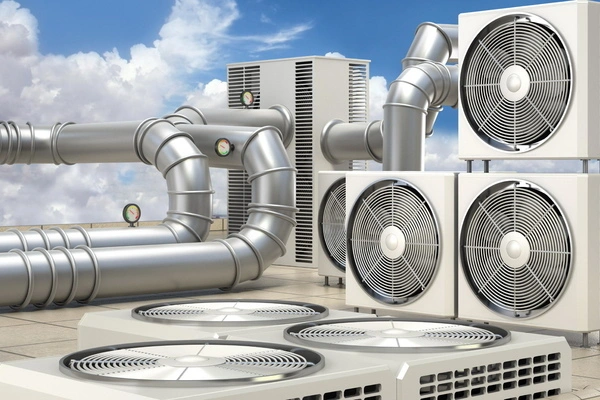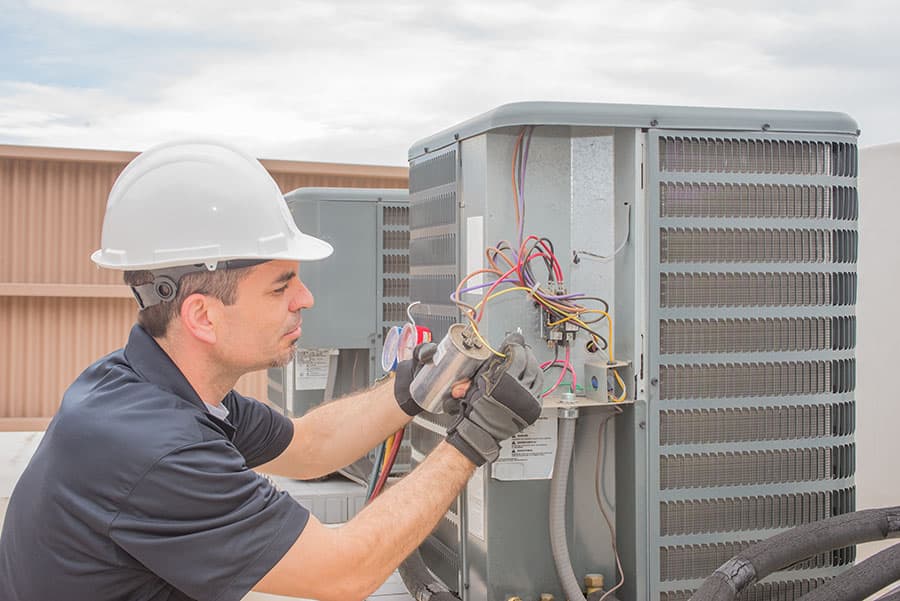Discover how HVAC experts offer subscription services for systems
Exploring the Essential Parts of an Efficient HVAC System
A reliable heating and cooling system is developed on numerous important elements that operate in harmony. Each part, from the thermostat to the ductwork, plays an important function in keeping comfort and energy performance. Comprehending these aspects is crucial for optimizing efficiency and improving indoor air top quality. As one checks out these parts, the detailed relationships between them reveal understandings into improving general system efficiency. What specific variables contribute most to this performance?
The Role of the Thermostat in A/c Effectiveness
Although often neglected, the thermostat plays a critical function in the performance of a/c systems. HVAC experts. This little tool functions as the primary control center, controling temperature settings and guaranteeing ideal convenience within a room. By accurately picking up the ambient temperature, the thermostat interacts with the heating, ventilation, and air conditioning units to maintain the preferred climate
An effective thermostat minimizes energy usage by activating the a/c system only when necessary, consequently avoiding excessive home heating or cooling. Modern programmable and smart thermostats enhance this efficiency better by enabling customers to set schedules and from another location change setups, adapting to daily routines.
In addition, the positioning of the thermostat is essential; inappropriate location can bring about unreliable temperature readings, resulting in ineffective operation. On the whole, a well-functioning thermostat not just improves convenience but likewise contributes significantly to energy savings and the longevity of the a/c system.
Recognizing the Significance of Air Filters
Air filters serve an important function in heating and cooling systems by assuring that the air distributing within a space remains clean and healthy and balanced. These filters catch dirt, allergens, and various other toxins, stopping them from being recirculated throughout the environment. By catching these particles, air filters add to enhanced interior air top quality, which can greatly benefit occupants' health, especially those with allergic reactions or breathing problems.
Furthermore, maintaining tidy air filters improves the efficiency of heating and cooling systems. Clogged up filters can limit air flow, creating the system to function more challenging to keep preferred temperature levels, causing enhanced energy consumption and higher utility costs. Frequently replacing or cleaning up filters is a vital maintenance step that can extend the life-span of heating and cooling tools. Eventually, recognizing the importance of air filters permits property owners and structure supervisors to take aggressive actions to assure a well-functioning, effective HVAC system that promotes a risk-free and comfy interior environment.

The Performance of the Heater and Warm Pump
Heaters and heatpump are important components of a/c systems, liable for providing warmth throughout cooler months. Heaters operate by heating air with combustion or electrical resistance, after that dispersing it throughout the home using ducts. They usually supply quick home heating and can be fueled by natural gas, electrical power, or oil, depending upon the system type.
On the other hand, heatpump move warm instead than generate it. They extract heat from the outside air or ground, even in low temperatures, and transfer it indoors. HVAC experts. This double capability allows heatpump to additionally give cooling in warmer months, making them functional options for year-round climate control
Both systems require proper upkeep to assure performance and long life. While heaters succeed in severe chilly, heatpump can be advantageous in modest environments. Comprehending their unique performances aids homeowners in picking one of the most appropriate option for their home heating needs.
Checking Out the A/c System
The air conditioning device is an essential element of heating and cooling systems, available in various kinds to suit various requirements. Understanding the performance scores of these units is crucial for making notified choices regarding energy intake and expense. This area will discover the diverse kinds of air conditioners and make clear how performance ratings influence performance.
Kinds Of Air Conditioners
While various variables influence the choice of air conditioning systems, comprehending the different kinds available is crucial for house owners and building managers alike. Central air conditioners are developed to cool down entire homes or structures, using a network of air ducts for air movement. Window units provide an even more localized remedy, ideal for little areas or single rooms. Portable air conditioning system supply versatility, permitting individuals to relocate the device as needed. Ductless mini-split systems are news one more choice, integrating the performance of central systems with the benefit of zoning, as they need no ductwork. Geothermal systems harness the earth's temperature for energy-efficient cooling. Each type features distinctive benefits, making informed selections important for efficient climate control.

Efficiency Rankings Described
Understanding efficiency scores is crucial for selecting the best air conditioning device, as these metrics supply insight right into the system's efficiency and energy consumption. The most usual score for ac unit is the Seasonal Power Effectiveness Ratio (SEER), which gauges the cooling outcome during a typical air conditioning season divided by the complete electric power input. A higher SEER indicates far better effectiveness. Additionally, the Power Efficiency Proportion (EER) is used for gauging effectiveness under specific problems. Another vital metric is the Energy Celebrity accreditation, which signifies that a device satisfies strict energy performance guidelines. By reviewing these scores, customers can make informed selections that not only enhance convenience but additionally reduce power prices and environmental effect.
The Significance of Ductwork and Air flow
Reliable ductwork design and air flow monitoring play essential duties in the total efficiency and efficiency of a/c systems. Proper ductwork guarantees that conditioned air is dispersed evenly throughout an area, decreasing temperature changes and boosting convenience. Properly designed ducts lessen resistance to air movement, decreasing the workload on cooling and heating equipment and ultimately reducing energy usage.
Air movement monitoring involves strategically placing vents and registers to enhance the flow of air. This stops typical problems such as warm or cool areas, which can take place when air movement is blocked or improperly well balanced. Additionally, the right duct materials and insulation can further improve efficiency by decreasing warmth loss or gain throughout air transit.
An efficient ductwork system not just adds to energy savings yet can additionally extend the lifespan of HVAC tools by minimizing unnecessary strain (HVAC experts). Comprehending the significance of ductwork and air flow is important for attaining peak Cooling and heating system performance.
Routine Upkeep Practices to Improve Efficiency
Normal maintenance methods are crucial for making sure peak efficiency of HVAC systems. These methods consist of regular examinations, cleaning, and required repairs to maintain the system running successfully. On a regular basis changing air filters is important, as clogged filters can obstruct air movement and minimize performance. In addition, technicians must check and clean evaporator and condenser coils to stop overheating and power wastage.
Annual professional evaluations are likewise suggested, as experienced technicians can determine potential problems prior to they rise. Lubricating moving components decreases wear and tear, adding to a longer lifespan for the system. Furthermore, guaranteeing that the thermostat operates appropriately aids in maintaining optimal temperature level control.

Often Asked Concerns
Exactly how Typically Should I Change My Thermostat?
Thermostats should generally be replaced every 5 to ten years, relying on usage and technology innovations. Normal checks are advisable to assure peak performance, especially if experiencing inconsistent temperature level control or boosted power costs.
What Dimension Air Filter Is Finest for My Heating And Cooling System?
The very best size air filter for a cooling and heating system varies by unit style. Commonly, it's important to speak with the owner's manual or check the existing filter dimensions to ensure peak efficiency and air top quality.
Can I Mount a Heatpump Myself?
Installing a heatpump independently is possible for skilled individuals, yet it calls for straight from the source understanding of neighborhood codes and electric systems. Employing an expert is recommended to guarantee proper setup and optimal system performance.
Exactly how Do I Know if My Ductwork Is Effective?
To determine ductwork performance, one should inspect for leaks, step air flow at vents, examine insulation high quality, and assess temperature differences in between supply and return air ducts. Specialist analyses can supply complete check my reference insights right into overall performance.
What Are Signs My A/c Requirements Immediate Upkeep?
Indicators that a cooling and heating system needs prompt maintenance include uncommon sounds, inconsistent temperature levels, enhanced power bills, undesirable odors, and regular cycling. Resolving these issues without delay can prevent further damages and assurance top system efficiency.
Air filters offer a vital feature in HVAC systems by ensuring that the air flowing within an area continues to be healthy and tidy. Furthermore, keeping tidy air filters improves the performance of A/c systems. Ductless mini-split systems are another alternative, integrating the efficiency of main systems with the benefit of zoning, as they need no ductwork. Recognizing efficiency ratings is vital for picking the ideal air conditioning device, as these metrics give insight right into the system's performance and energy intake. The finest dimension air filter for a Heating and cooling system differs by device design.